About Us
We are a nonprofit organization working to restore degraded landscapes, improve the lives of smallholder farmers, and regeneration of forests.
Who We Are
Green Landscape Association (GrEEN) is a Cameroon based nonprofit organization working in the South West, North West and West Regions of Cameroon.
GrEEN is contributing in restoring degraded landscapes and impacting the lives of smallholder farmers through agroforestry and tree planting, conservation of biodiversity through advocacy and sustainable management of degraded agricultural lands, promoting environmental education, as well as empowering rural communities through innovative economic and livelihood development programs.
GrEEN was founded as Green Landscape Association (GrEEN) with its legal head office in Buea, Fako Division, Southwest, Cameroon.
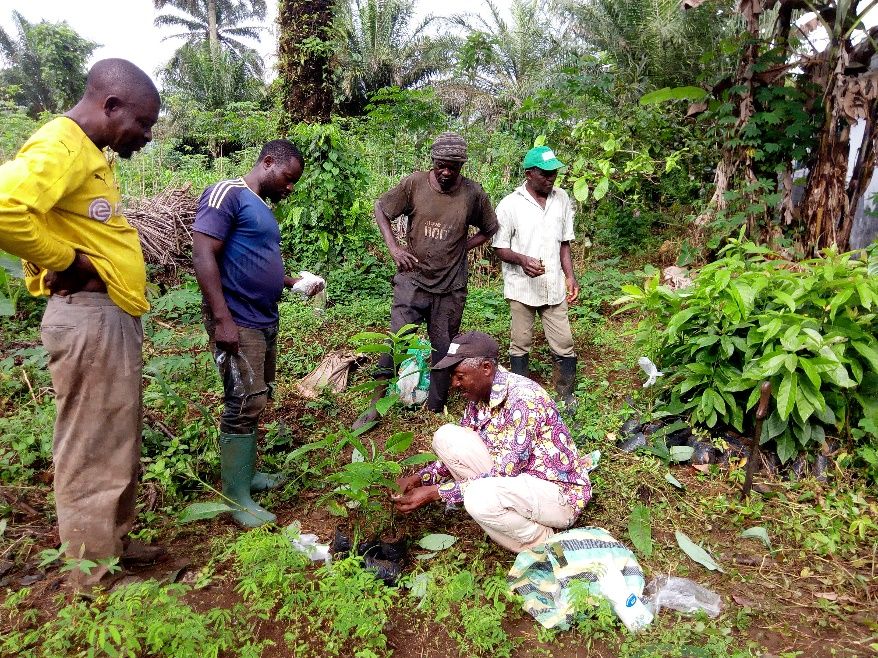
Our Vision
We believe in a world where humans live in harmony with nature, biodiversity conserved and degraded landscapes restored.
Our Mission
About the Founder and Background of the Organization
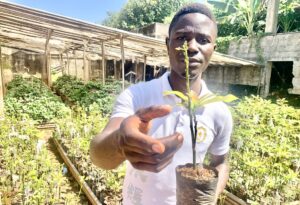
This urge encouraged him to carry out several researches to understand the problems and find some sustainable solutions. Most of these research conducted were published in open access Journals.
When Ernest launched his first ever initiative “The NOSO Smallholder Farmers Resilience Initiative” in 2021, little did he know that this will turn out to be the exclusive brand for GrEEN that will bring glory.
With experience built up in NGO management, Ernest understood that any long-term success for small non-profits will exclusively depend on the type and quality of partnership that GrEEN leaders will engage in. Backed with this knowledge, GrEEN leadership is engaging in key partnerships with professional organisations. These early international partnerships will be crucial in the development and growth of GrEEN.
The early engagement of the Cameroon government in GrEEN has been a very strategic decision. The Ministry of Environment, Nature Protection and Sustainable Development (MINEPDED), Ministry of Agriculture and Rural Development (MINADER) and the Ministry of Forestry and Wildlife (MINFOF) have demonstrated their commitment to support the growth of GrEEN.
GrEEN is also striving to take the lead in many national rural development and environmental initiatives in Cameroon. From the experience built up in GrEEN, the growth and success of any organisation depends on the vision of its leadership, strategic partnerships, steady leadership, long term commitment of its leadership, accountability, visibility and transparent actions and meeting international goals.
The world is witnessing an unprecedented decline in soil fertility, farmland degradation and destruction caused by the extraordinary human pressure being manifested by civil wars, famine and poverty.
While the role of international non-governmental organisations cannot be over emphasised in providing the overall lead in saving the environment, reducing hunger and poverty, their numerical strength has not been able to cause or stop this rapid continuous decline.
In this backdrop, the role of the national agricultural and environmental organisations as well as the impact cannot be neglected.
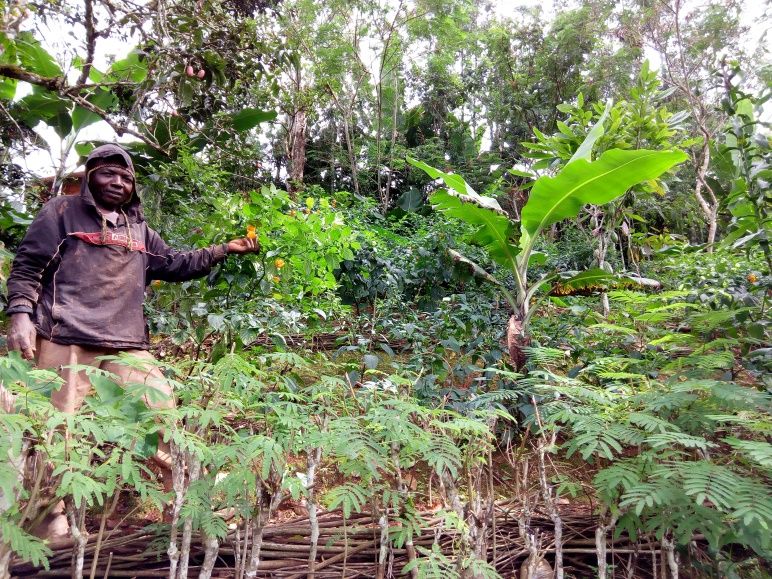
As a vibrant young environmental organisation in Cameroon, GrEEN has been lobbying with the government to realise the need towards restoring degraded agricultural landscapes, regeneration of forest through tree planting and agroforestry, conservation of biodiversity and sustainable management of degraded agricultural lands as well as empowering rural communities through innovative economic and livelihood development.
Help us restore degraded landscapes, improve the lives of smallholder farmers, and regenerate forests by making a donation.
Our Programs
Where we work
GrEEN is working across the South-West, North-West and West Regions of Cameroon with a special focus on the Mount Bamboutos. According to the Organisation’s Strategic Action Plan for the next 10 years, GrEEN has decided to extend its operation across the Adamawa Region of Cameroon
Why this location?
Historically, Mount Bamboutos has been known as one of the West and Central African top biodiversity hotspots; home to primates, birds, amphibians and plants, including high numbers of endemic species. However, anthropogenic pressures and poor implementation of regulations, along with lack of legal protection, have caused severe deforestation and degradation. Therefore we have chosen this location because we want to bring back the biodiversity hotspots.
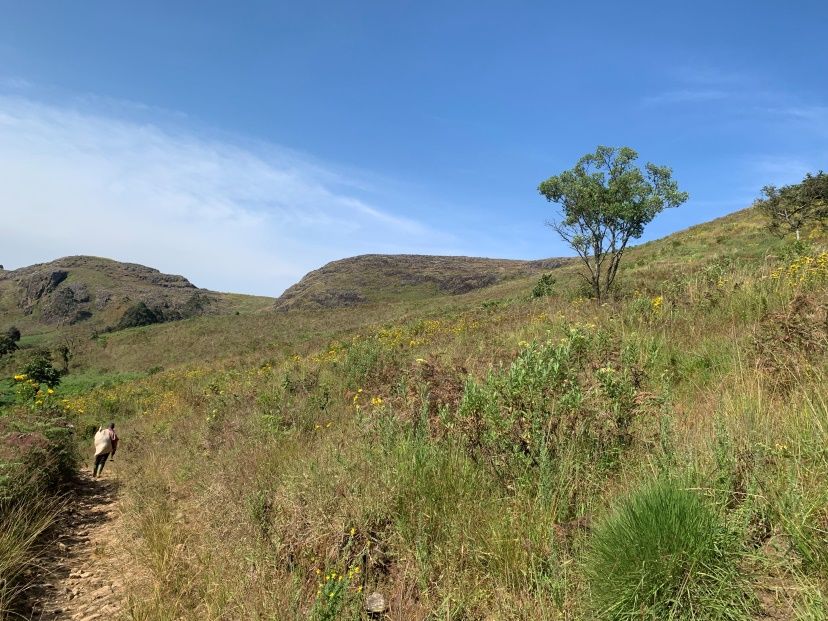
Some parts of Mt Bamboutos have been almost completely deforested and converted to agriculture and settlements. The upper slopes and caldera are largely used as pasture, and intensive horticulture is increasingly practiced. As a result of the habitat loss, biodiversity has been severely reduced, with many of the species going into local extinction.
What remains of the global biodiversity today, in the piedmont sections and steep gallery forests of this mountain, includes: the Preuss’ Guenon (Cercopithecus preussi), Coopers Mountain Squirrel (Paraxerus cooperi), the Bannerman’s Turaco (Tauraco bannermani), the Bamenda Pririt (Latysteira laticincta), the Cross River gorillas (Gorilla gorilla diehli), the Nigeria-Cameroon chimpanzees (Pan troglodytes ellioti), the Ternstroemia sp and Allanblankia gabonensis.
Stakeholders Partnership and Development
GrEEN’s strategy seeks to harmonise its activities with those of public and private agencies active in the field of agriculture, environment and sustainable development both nationally and internationally. The strategic role of GrEEN in these partnerships will be to provide practical and up to date knowledge and data base within its core research areas while promoting restoration activities in its geographical area of focus. Contributions from visiting scientists, colleagues and international volunteers will add diversity and value to GrEEN’s efforts, as well as increasing its regional profile in the international community.
Tree Planting and Restoration Strategy

Coordinate and supervise the planting of 1,000,000 trees to restore fragile mountains and lowlands and their ecosystem functions and services in community-led restoration projects by 2030.
Livelihoods Development Strategy
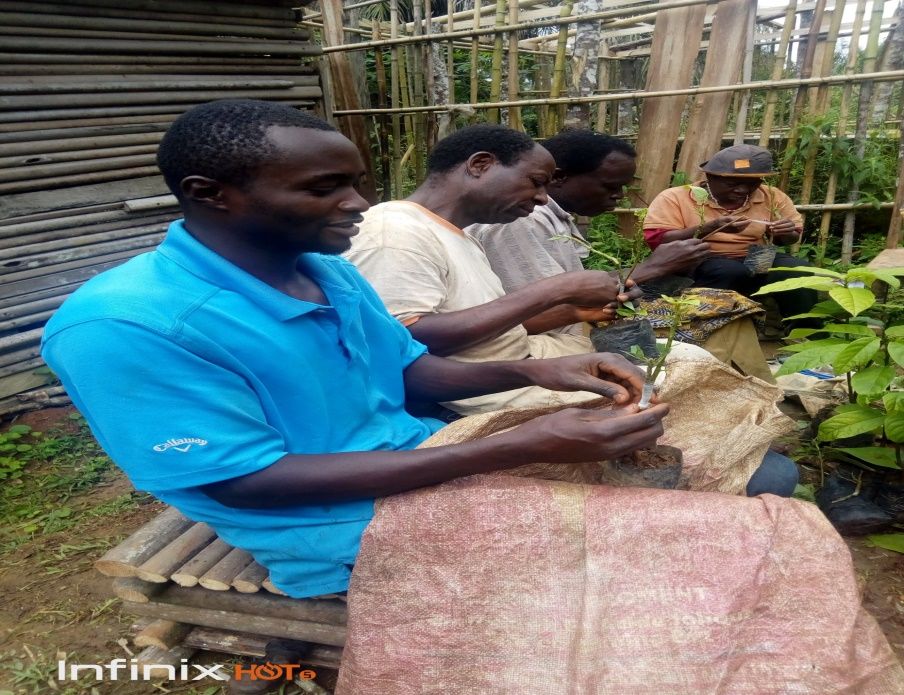
Improve the livelihoods of at least 2,000 smallholder farmers and their households through increased tree crop production, improved diversified nutrition, increased household income, and improved value chains of tree products leading to household food security and economic stability by 2030.
We work to improve food security and incomes of smallholder and marginalized farmers. This is being achieved through a holistic and sustainable development of the Forest Garden model that has proven to secure long term impact beyond the local communities to other urban areas.
This model incorporates conservation agriculture, finance and income, agroforestry, farm forestry, water and irrigation development, organic agriculture, value chain development, gender, food security and nutrition. It is a 4 year model that seeks to transform smallholder agriculture into sustainable long term business model that provides triple functions of food security and nutrition, investment income and nature protection.
The agroforestry program in Cameroon is on the traditional agroforestry which have to do with planting of nitrogen fixing trees for soil fertility improvement. This increased the yields of farmers and income levels. Additional advantages include increase fuel wood for household. However, this is not enough because the farmers remained poor.
Cognizant of this gap, Forest Garden Approach focused on soil health, food security, income and nutrition. The farms will then be diversified with the introduction of fruit trees, NTFPs/medicinal, and timber species. Farmers interest have doubled with many more farmers participate and income increasing at a rate 5% per year.
Support us increase food security of 2000 smallholder farmers through increased access to diverse food.
we are planting trees to protected the environment and improve food security. Planting trees generates jobs, protects biodiversity, and captures the greenhouse gas CO2. Trees buy us valuable time, which we need to use to reduce our CO2 emissions.
Support us set up at least 10 cottage industries to absorbed at least 500 hunters, trappers, youths, farmers etc in the forest adjacent communities.
Internship Training Strategy
Train and mentor 20 interns with diverse expertise that should constitute a database of young professionals willing to take up leading positions in field implementation of project activities and in the conception, development, monitoring, evaluation and impact assessment of new projects.
Help us restore degraded landscapes, improve the lives of smallholder farmers, and regenerate forests by making a donation.
Challenges Faced by Local Population and Farmers
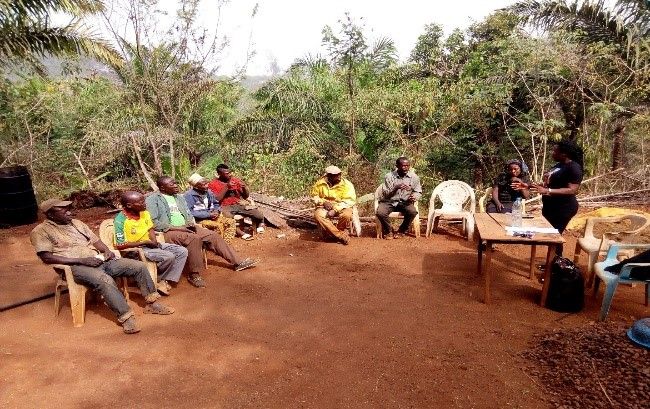
Today, over 30,000 rural people depend directly on the Mount Bamboutos ecosystem for their livelihoods. The destruction of forests in almost all catchments has led to serious water shortages. Demographic pressure on limited land has resulted in encroachment into marginal sloping areas, causing continuous erosion and regular landslides.
Intensification of agriculture and horticulture continues to lead to soil erosion, poor soil quality and food and water contamination, which will result in decreasing yields, reduced incomes and possible food insecurity.
Farmers have been using high levels of fertilizers and pesticides for the horticultural crops, and may have a poor understanding of the real economic and environmental costs – hence the high risk of increased soil and agro ecosystem degradation and declining crop yields.
Poverty remains widespread, 75% of the rural Cameroonian population live below the poverty line. Agroforestry and sustainable farming, indigenous non-timber forest product (NTFP) value addition and improved access to markets, will improve livelihoods and economic resilience. Agroforestry will increase tree cover, improve soil quality and fertility; improve crop diversification and agroecosystem functions.
In parallel, native tree planting and regeneration in community, riverine and sacred forests will re-establish biodiversity, consequently, commencing the process of ecosystem restoration. This will open up future opportunities for eco-tourism and associated income generation.
